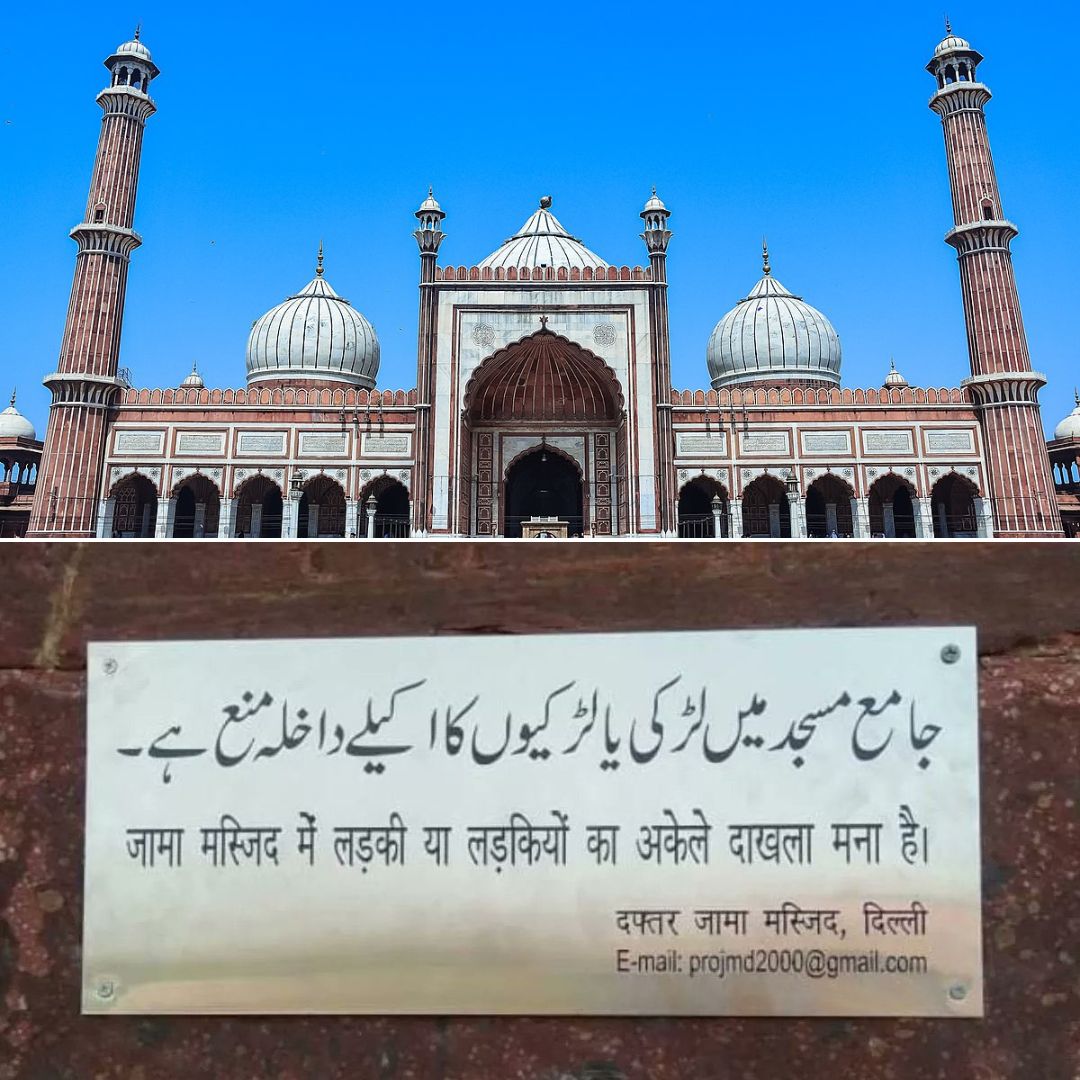Controversial Notice Outside Jama Masjid Gets Withdrawn After Widespread Backlash
Writer: Laxmi Mohan Kumar
She is an aspiring journalist in the process of learning and unlearning many things. Always up for discussions on everything from popular culture to politics.
Delhi, 25 Nov 2022 7:05 AM GMT
Editor : Jayali Wavhal |
She writes about gender issues, human interest, and environment.
Creatives : Laxmi Mohan Kumar
She is an aspiring journalist in the process of learning and unlearning many things. Always up for discussions on everything from popular culture to politics.
The notice outside the historic Jama Masjid restricted unaccompanied women from entering the premises of the mosque. Since then it has raised questions on the right of a woman to worship in a democratic setting.
On November 24, an image of the Jama Masjid administration's notice that restricted the entry of unaccompanied women into the mosque sparked an outrage. It raised several questions regarding the regressive nature of the regulations placed on the place of worship. Several even demanded the mosque to withdraw such restrictions.
Official authorities soon picked up the issue, and the mosque revoked their decision upon Lieutenant Governor (LG) of Delhi VK Saxena's request to the Shahi Imam.
Controversial Notice
The 17th-century Mughal-era mosque is a historic place of worship and a famed tourist attraction in the country. The undated notice posted outside the three entry gates of the mosque, which came to the notice of people recently, read: "Jama Masjid mein ladki ya ladkiyon ka akele daakhla mana hai," which translates to, "The entry of a girl or a group of girls alone would not be permitted in Jama Masjid".
As the controversy escalated and drove in questions from official authorities, the mosque's Shahi Imam responded that the order did not apply to the devouts who come to the masjid to offer prayers. The Imam mentioned that the decision was implemented after certain incidents were reported to the administration.
A report by NDTV quoted him saying, "Masjid is a place of worship, and people are welcome for that. But girls coming alone and waiting for their dates, this is not what this place is meant for. The restriction is upon that." Clarifying the regulation, he added that earlier they had seen a group of 20-25 girls coming in to pray, and the doors of the mosque would be open to any person visiting to offer prayers.
Justifying their decision, Jama Masjid spokesperson Sabiullah Khan conveyed that many women were seen visiting the historical place to make videos. In the past, music video shoots by visitors were not entertained at the premises and the administration had hung a board outside the gate back then informing people that "music video shoot is strictly prohibited inside the mosque."
On similar grounds, they would not be allowed unless the person would be visiting to offer prayers or as a part of their tourist visit.
He also suggested that teams would be deployed to enquire about the purpose of the visit with the people and permit their entry only if the reason is found to be appropriate. Tourists will also be welcomed, but they will not be allowed to shoot videos and will be asked to return if they are found indulging in 'inappropriate' actions.
Reactions To The Regulations
The notice instantly blew up and had several women's rights bodies and activists deem the mosque's decision unacceptable. On behalf of the Delhi Commission for Women (DCW), its chief, Swati Maliwal, asked the Centre and the Delhi government for a report and appropriate action against the ban that lay in "clear violation of women's rights". Maliwal tweeted that the Masjid "is completely wrong to ban the entry of women" and added that women have the same rights as men in places of worship.
She also posted a video responding to the Jama Masjid controversy and said it was a "shameful" act. Further, she questioned the Masjid administration and asked, "What do they feel? This is not India. This is Iraq? Nobody will raise a voice against discrimination meted out to women openly...Nobody is above the Constitution. For such a Talibanesque act, we have issued a notice to them." The DCW officially sought details on the restriction and asked for a copy of the minutes of the meeting during which the decision was taken.
यह शर्मनाक और गैर संवैधानिक हरकत है। इस बैन को हर हाल में हटवा के रहेंगे। ये भारत है ईरान नहीं: स्वाति मालीवाल pic.twitter.com/urePTlxAxc
— Shubhankar Mishra (@shubhankrmishra) November 24, 2022
Several activists, such as Ranjana Kumari and Yogita Bhayana, stepped up against the decision and said that such regressive regulations only had a place in society centuries ago. Backing them up, RSS-affiliate Vishva Hindu Parishad (VHP) also commented on the incident and termed the move "anti-women and unconstitutional". With the growing backlash, the Delhi LG spoke with the Shahi Imam and had him withdraw the decree. The Imam noted, "We have removed the notice boards. But people visiting the mosque have to maintain its sanctity."
Religion And Women
This would not be the first time that a religious place imposed regulations on their women devotees. Religion continues to be an institution in India, through which historically, women have had to face regulations and limitations. Many women continue to be barred from offering prayers while they're on their periods, while some other places of worship ban pregnant women from entering the premises after a certain point. And some places completely ban the entry of women.
Bans on the entry of women have, however, been faced with massive outrage over time. It has triggered debates regarding the validity of such institutions and regulations in a democratic setting. Yet, despite the many court rulings and activism, few places of worship outrightly discriminate against women and violate their fundamental rights. The recent regulation set by Jama Masjid was revoked due to the widespread backlash, but this continues to be the grim reality of the world's largest democracy.
Also Read: Kerala: Man Attacks Activist Bindu Ammini, First Woman To Enter Sabarimala; Held
 All section
All section















